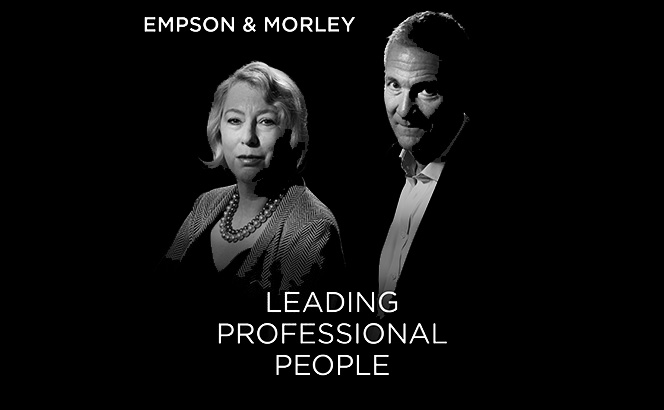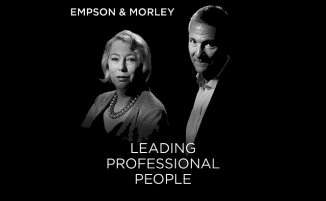Traditional leadership models suggest people hanker for a hero in time of crisis. That’s an unfamiliar and uncomfortable role for law firm leaders say Professor Laura Empson and David Morley
What do people look for in their leaders when crisis strikes – especially one as profoundly disconcerting, enduring and uncertain as the current Covid-19 pandemic?
Standard theories of leadership still promote an old-fashioned archetype – the heroic, visionary leader providing people with clear direction and a sense of reassurance and calm.
But in professional firms that is an unfamiliar model. Any law firm leader trying to play the hero is likely to be quickly cut down to size by their inherently sceptical partners. The chances are your colleagues have known you for too long and too well to accept you as their hero.
In calmer times – let’s call it ‘peacetime’ – the leader’s role is to build consensus, whether that’s around daily operational decisions or long-term strategy. Change can be frustratingly slow – it comes through evolution rather than revolution.
When crisis strikes and the firm moves on to a ‘war’ footing, the dynamic suddenly changes. The switch can come as a significant shock to a leader more accustomed to slow-moving, consensual change – a surprise that risks leaving you paralysed, unsure what to prioritise and when.
One leader of a successful professional firm, asked how he was coping with the pandemic at the start, put it well when he said: ‘The expression “coming up for air” no longer works. There’s no air left in the atmosphere.’
As the crisis breaks, expectations of leaders change dramatically. Now your partners not only welcome direction, they actively look for a more decisive style. And, particularly in a crisis as disruptive as the present one, they also look for comfort and reassurance.
So, your partners want you to become more emphatic and empathetic – sometimes at the same time. The crisis demands of leaders the ability to quickly pivot from a ‘peacetime’ to a ‘wartime’ leadership style – and back again.
Suddenly all eyes are on you, something that can feel very uncomfortable when playing a more heroic role feels not only unfamiliar but strangely inauthentic.
So, where to begin? This was something we discussed with Wim Dejonghe, global senior partner of Allen & Overy, in the most recent episode of our podcast Empson & Morley – Leading Professional People.
When crisis strikes the first priority is to steady the ship quickly. That means moving ruthlessly and decisively to secure the firm’s immediate financial position.
It may seem odd to focus single-mindedly on managing cash and increasing the firm’s capital.
What about the people? What about providing comfort and reassurance at a time when people will be wrestling with deep and far-reaching anxieties around the future of the firm, their clients, their jobs and the practical difficulties of working remotely, in isolation, juggling work and family?
The hard reality is that there’s no point being an empathetic leader if the organisation is fast swirling down the plughole.
And when there is no immediate plan in place, as is often the case at the very onset of a crisis, taking this kind of decisive action buys you time to figure out a longer-term strategy for moving the firm forward.
It can bring other benefits too, allowing you to tackle issues that may have been left to slide in the boom times, such as simple but essential bits of financial housekeeping like persuading partners to bill on time and collect unpaid bills.
As the crisis drags on, the time will come to re-establish balance, responding to people’s desire to see more empathy and understanding from the leadership.
It’s an important chance to reach out to people, show a more human touch, perhaps share personal experiences of how you and they are coping with the crisis’s extraordinary tough demands.
It’s not about providing false hope that everything will be well – that’s not credible. Nor is it about emoting. That won’t wash either.
But a genuine effort to share experiences – even feelings of vulnerability – can allow a leader to make powerful connections with colleagues and gain insights that wouldn’t be accessible in standard times.
Having the ability to flex between these two styles – emphatic and empathetic – and to strike the right balance between them is, therefore, clearly a crucial skill.
So is the ability to pace yourself.
That’s especially true in the current crisis, which has been far more of a long grind than past events, such as the financial meltdown of 2008/9.
It’s been easier to calibrate your response to the crisis in the past.
This time making finely tuned judgements is particularly hard because no one can accurately predict the direction, pace or duration of the pandemic and its inevitable deep economic impact.
That makes it all the more important to set the right pace, recognising that you will need to find the energy to manage the crisis day to day, long after the first dizzying rush of adrenalin has been used up.
This crisis has placed leaders at all levels under tremendous pressure. Those leaders able to flex their style, pace themselves and stay positive are those most likely to enable their firms to emerge strongly the other side.
Click here to listen to their latest podcast, Empson & Morley – Leading Professional People, where Professor Laura Empson and David Morley discuss crisis leadership with Wim Dejonghe, global senior partner of Allen & Overy.











